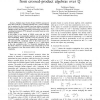Free Online Productivity Tools
i2Speak
i2Symbol
i2OCR
iTex2Img
iWeb2Print
iWeb2Shot
i2Type
iPdf2Split
iPdf2Merge
i2Bopomofo
i2Arabic
i2Style
i2Image
i2PDF
iLatex2Rtf
Sci2ools
CORR
2011
Springer
2011
Springer
A family of fast-decodable MIDO codes from crossed-product algebras over Q
—Multiple Input Double Output (MIDO) asymmetric space-time codes for 4 transmit antennas and 2 receive antennas can be employed in the downlink from base stations to portable devices. Previous MIDO code constructions with low Maximum Likelihood (ML) decoding complexity, full diversity and the nonvanishing determinant (NVD) property are mostly based on cyclic division algebras. In this paper, a new family of MIDO codes with the NVD property based on crossed-product algebras over Q is introduced. Fast decodability follows naturally from the structure of the codewords which consist of four generalized Alamouti blocks. The associated ML complexity order is the lowest known for full-rate MIDO codes (O(M10 ) instead of O(M16 ) with respect to the real constellation size M). Numerical simulations show that these codes have a performance from comparable up to 1dB gain compared to the best known MIDO code with the same complexity.
| Added | 19 Aug 2011 |
| Updated | 19 Aug 2011 |
| Type | Journal |
| Year | 2011 |
| Where | CORR |
| Authors | Laura Luzzi, Frédérique E. Oggier |
Comments (0)

